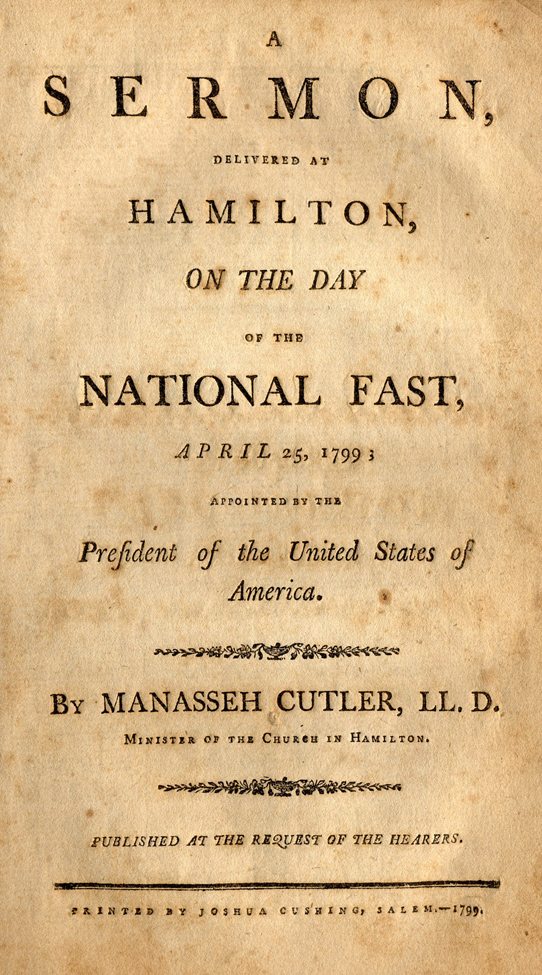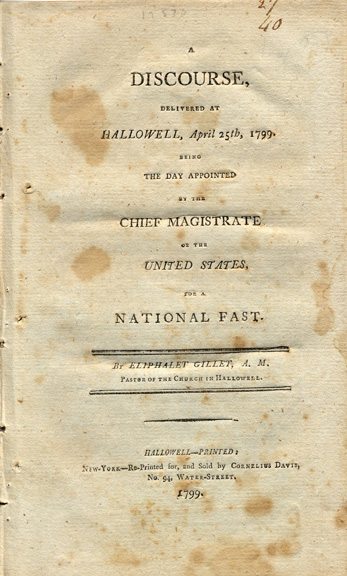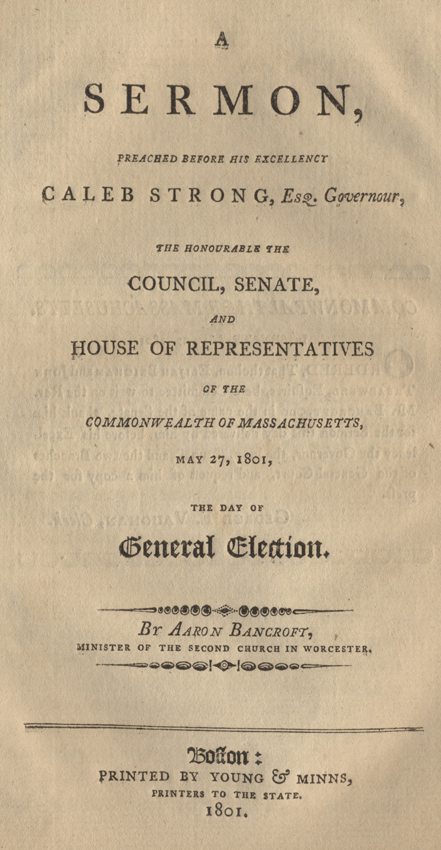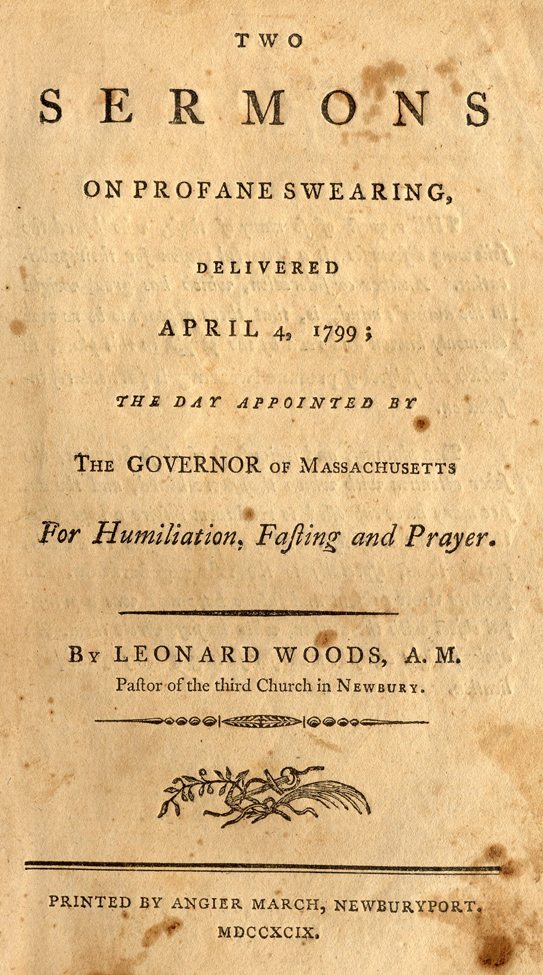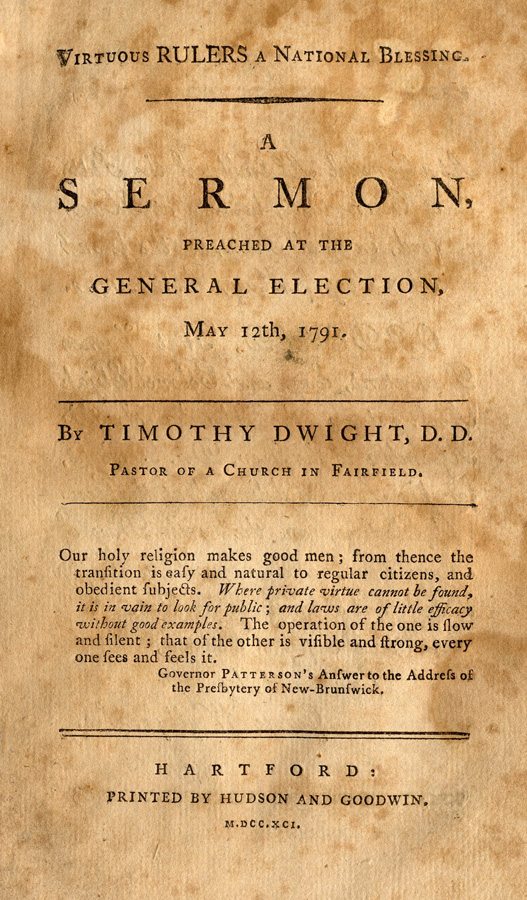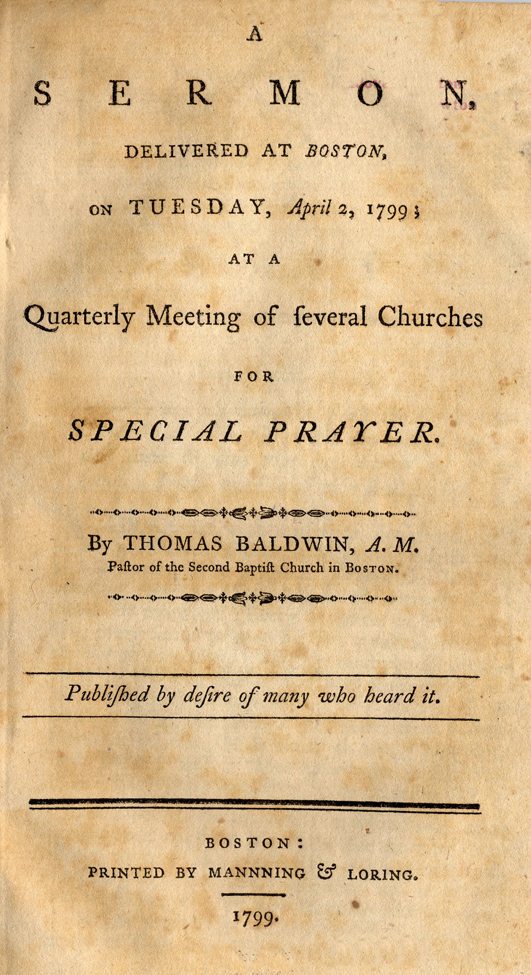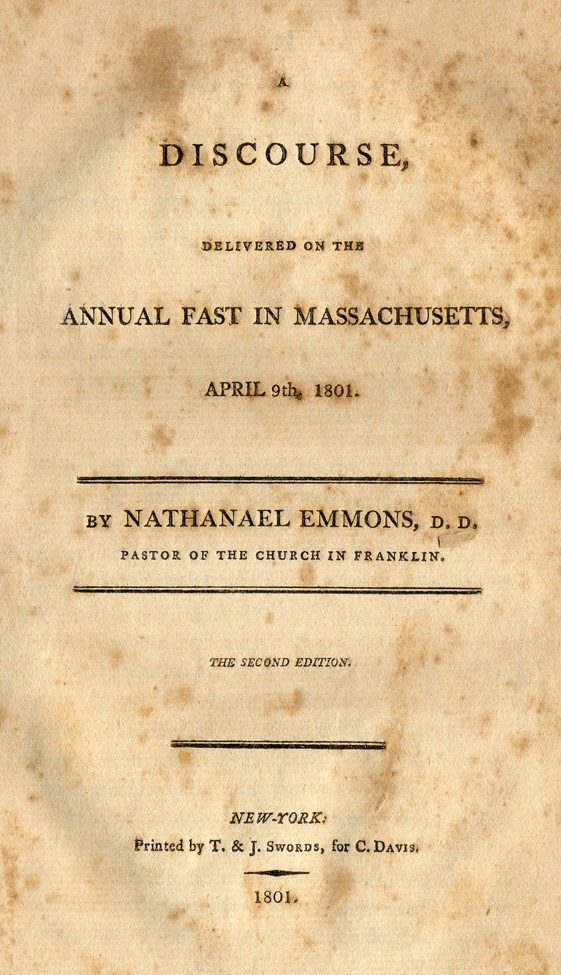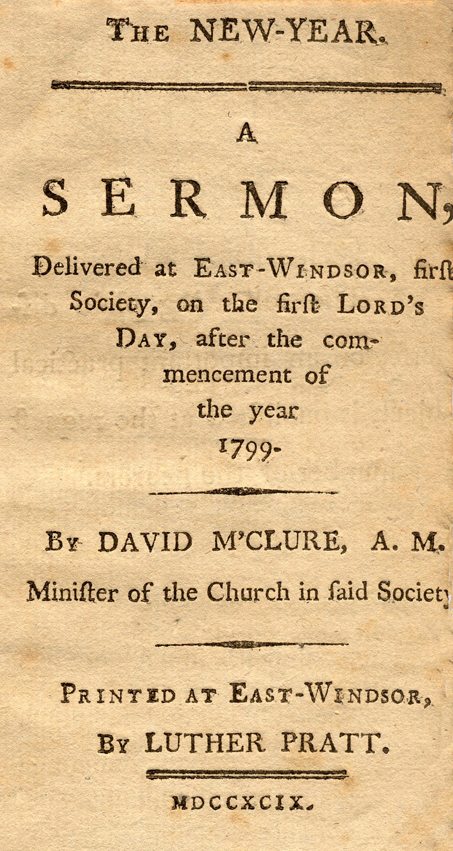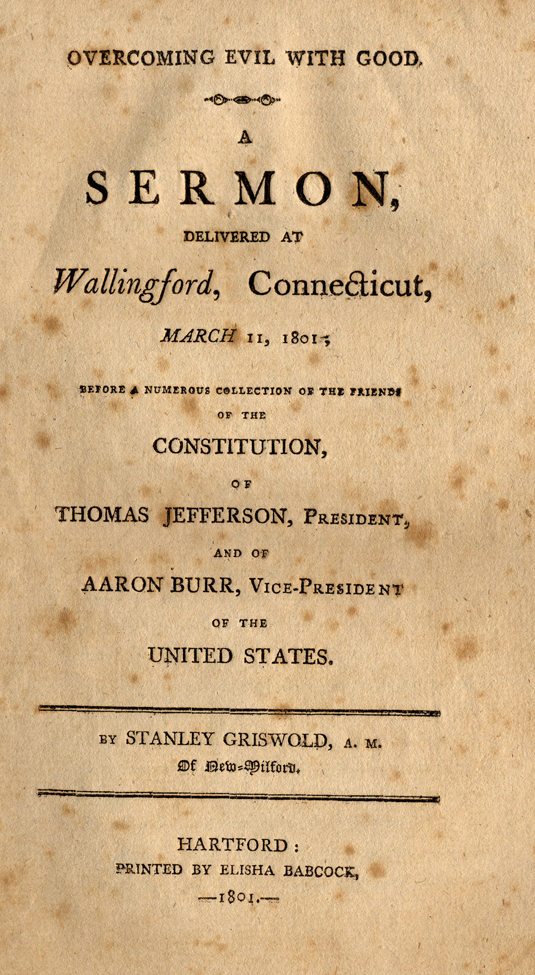Cyprian Strong (1743-1811) graduated from Yale in 1763. He served as a town clerk in Farmington, Connecticut (1766) before becoming pastor of a church at Chatham, CT (1767-1811). Strong preached this sermon in Connecticut on May 9, 1799.
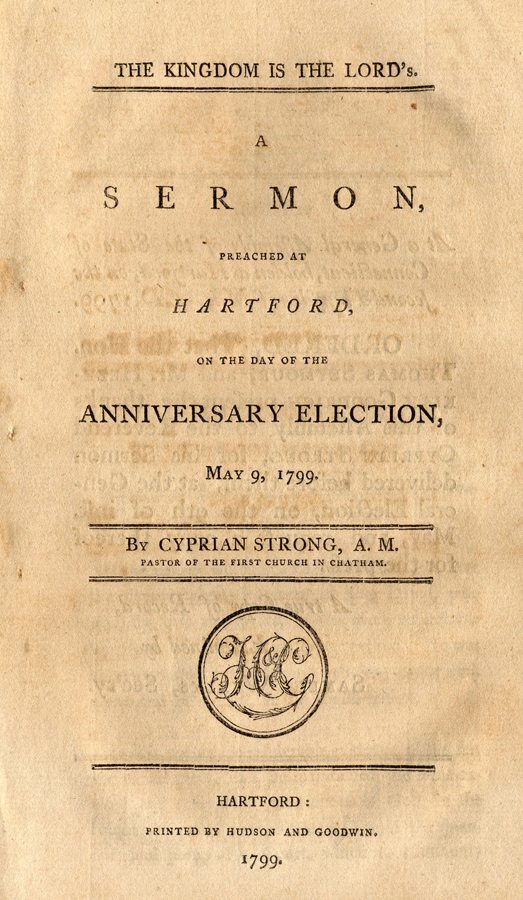
A
S E R M O N,
PREACHED AT
HARTFORD,
ON THE DAY OF THE
ANNIVERSARY ELECTION,
May 9, 1799.
By CYPRIAN STRONG, A. M.
PASTOR OF THE FIRST CHURCH IN CHATHAM.
At a General Assembly of the State of Connecticut, holden at Hartford, on the second Thursday, of May, A.D. 1799.
ORDERED, That the Hon. Thomas Seymour, and Mr. Hezekiah Goodrich present the thanks of this Assembly to the Reverend Cyprian Strong, for his Sermon delivered before them, at the General Election, on the 9th of Inst. May, and request a copy thereof for the press.
A true Copy of Record,
Examined by
Samuel Wyllys, Sec’ry.
I CHRONICLES xxix. 11.
–Thine is the Kingdom, O Lord, and thou art exalted as Head above all.
In the passage which has now been read, we have the devout acknowledgment of king David, who was the first magistrate, in the most respectable kingdom, which, at that time, existed. He was as remarkable for piety and religion, as for eminence and distinction, in the Jewish nation.
It was not an inconsiderable evidence, of the fervor of his piety, that he maintained the most exalted and reverential conceptions of God, in the height of earthly magnificence, amid the splendor and pomp of a Court, which so commonly dazzle the eyes of mankind, and plunge them into scenes of voluptuousness.
Nebuchadnezzar, who was at the head of the Chaldean Empire, was so intoxicated, with the splendors of royalty, that “his heart was lifted up and his mind hardened in pride,” so that he did not know and consider, “That the Most High ruleth in the kingdom of men.” And, fact and experience afford the most convincing evidence, that worldly distinctions and honors, through the native corruption of the human heart, have a most powerful tendency to render men unmindful of Him, by whom “kings reign and princes decree justice.” But, this was very far from being exemplified in David. Although, from a shepherd, he was raised to a throne, and exalted as the head of a respectable and truly great nation, which always reverenced his authority; yet, he did not, through pride of heart, so rate his dignity and worldly consequence, as to think it beneath him, devoutly to acknowledge God, as the Supreme Ruler of the universe. He was sensible, that his elevated station and worldly magnificence, were the fruit and effect, of God’s sovereign disposal. In the text, he most devoutly ascribes everything to Him. “Thine is the kingdom, O Lord, and thou art exalted as head above all.” And, in the succeeding words, “Both riches and honors come of thee—in thine hand it is to make great, and to give strength unto all.”
It may be further observed, that king David was not only ready, most solemnly to acknowledge, the existence of God; but he viewed and reverenced him “as head above all.” Not as the prophet Elijah sarcastically described Baal, as an idle talker, or as pursuing a journey, or as sleeping; or, in a word, as being an idle and unconcerned spectator of the world; but as being particularly concerned in the government and control of the universe.—“Thine is the kingdom, O Lord, and thou art exalted as head above all.”
The text will naturally direct our attention, to the two following things.
I. The nature of that kingdom, which is said, in the text, to be the Lord’s.
II. In what sense the kingdom may be said to be the Lord’s, and that He is exalted as head above all.
It is hoped, that in the prosecution of what has now been proposed, such observations and remarks will be made, as will render the discourse both seasonable, and pertinent to this public anniversary.
I. It is proposed, to attend to the nature of that kingdom, which, in the text, is said to be the Lord’s.
The inhabitants of this world, are divided into many kingdoms and governments, which, in the sacred scriptures, are called “the kingdom of men.” But that kingdom which is said, in the text, to be the Lord’s, has not a respect to any one of those kingdoms, in exclusion of the rest.
The time has been, indeed, when God took upon himself the government of the Hebrews; and, in his dispensations, a very special respect was paid them. His administrations were particularly directed, to the establishment of that favorite people; yet God was, at the same time, as truly at the head of other nations, and did dispose of and superintend all their affairs, in the same manner that he did the affairs and concerns of the Jews. God had purposes to answer, relative to the Jewish nation, which he had not respecting other nations; for they were a chosen people. Although the allotments of God, to other nations, were subordinated to the advancement of the Hebrews, yet, events were allotted out to the former, in as immediate and efficient a manner as they were to the latter. The purposes of God, respecting different nations, have been different; yet God has not at the present time, nor ever had in time past, a more immediate disposal of the affairs of one nation than of another. The kingdom, which in the text is called the Lord’s, is not limited by or confined to any earthly kingdom.
But, the kingdom which is the Lord’s does, in a sense, embrace the universe; consisting of all ranks and grades of creatures, throughout all worlds. The government of God extends to all things, both animate and inanimate. All the worlds and creatures which God hath made, constitute one system. The various orders of existences, from the archangel to the most inconsiderable insect, constitute the links of a perfect chain, and are like wheels which are necessary to complete a perfect machine. They are all necessary to form a perfect system. And, as the Lord is “exalted as head above all,” so all things which exist, are comprehended in his kingdom. God manages every part of the universe, in such a manner, as shall best answer the purposes which he had in view, when he brought them into being.
The sacred scriptures teach us, thus to consider the extent of the kingdom which is the Lord’s. In them, God is said to rule among the nations—to build them up or pluck them down at what instant he pleases. Famine, pestilence and the sword are said to be under his control. It is God who balances the clouds, and gives the former and the latter rain in their season. And it is further asserted, that the superintending care and disposing hand of God are concerned, even in the falling of the sparrow to the ground. The kingdom which is the Lord’s, therefore, comprehends the universe. Hence, in the text, God is said to be “exalted as Head above all,”—above everything which exists.
Again; to our having proper apprehensions of the kingdom which is the Lord’s, it is necessary to bring into view not only its extent, but the object or end of it.
God does not exercise a control over the universe, and concern himself with the affairs of all ranks of creatures, as a mere amusement; he has an important object in view, in all his administrations; and, that is to raise up and establish a kingdom of holiness and righteousness.
The government of God does consist, summarily, in so conducting and arranging events, as shall, eventually, advance the spiritual and moral good of the universe, or establish a holy and spiritual kingdom. All the plans, institutions and operations of God are directed to that end. The end of the natural is the moral world. As all the ranks and orders of existencies are to be considered, as so many links of a perfect chain, so all the events which take place, and all God’s appointments and institutions are to be viewed, as so many means to advance the moral and spiritual good, or the holiness and happiness of intelligent beings; and so to establish and perfect a kingdom of holiness and righteousness. And, all being united, do form a perfect system of means and events, for the security of so important an object.—As the advancement and establishment of a kingdom of righteousness require, God builds up or pulls down earthly kingdoms. The great Monarchies of the world, which have been raised up and again tumbled into ruin, have been subordinated to this interesting design. The constitution and laws of the natural world, when they cease to contribute to the establishment of such a kingdom, will be abolished; yea, the whole natural world, when it shall have accomplished everything of that nature which it can answer, will be consigned over to destruction. Events will roll on until a holy and spiritual kingdom shall be established and become triumphant. Then, the rotation of events, like the present, shall cease. Earthly kingdoms and empires shall sink into ruin—the sun shall shine no more, the various parts of the natural world shall be unhinged—a universal conflagration will take place, and former things shall be remembered no more.
That this representation, of the object of God’s government, is real and not imaginary, appears from many considerations, which can be but very briefly mentioned, at this time.
It appears, very particularly, from the design of the incarnation and sacrifice of Jesus Christ; or the introduction of the mediatorial plan.
This great event is considered, in the sacred writings, as above all others calculated, to answer the purposes, which God had in view, in the whole work of creation and the government of the world. And, the end which God had in view in that astonishing event was, indubitably, the establishment of a kingdom of holiness. Hence it is said, that he “gave himself for us, that he might redeem us from all iniquity, and purify unto himself a peculiar people, zealous of good works.” 1 And the church is said to be redeemed by his blood, “to the intent, that now unto the principalities and powers, in heavenly places might be known, by the Church, the manifold wisdom of God; according to the eternal purpose which he purposed in Christ Jesus our Lord.” 2 And, Jesus Christ is now exalted at the head of all principalities and powers, and will reign until all enemies are brought at his footstool. And the issue of this great affair is summed up in this, that God shall “reconcile all things to himself, by him, whether they be things in earth or things in heaven.” From these passages of scripture, as well as from the declarations and prophecies concerning the increase, progress and issue of the kingdom of Christ, which is founded in his blood, it is extremely evident, that the end God had in view, in the incarnation, death and sufferings of Jesus Christ, and in the whole work of redemption, was the advancement and establishment of a kingdom of holiness and righteousness. And, from thence we may certainly infer, that this is the great object, which God has in view in his whole government.
The same conclusion becomes further evident, from the end, which God has in view, in the religious institutions he hath made. The end proposed in institutions of a religious nature, is, unquestionably, to render mankind holy and spiritual.
Again; that the end of God has in view, and that the object of his government is, the establishment of a kingdom of righteousness is evident, from the great and fundamental laws of his kingdom; or, from what he chiefly requires, of his intelligent creatures. God’s requirements are all summed up in holiness and righteousness—in universal love and good will. This clearly indicates what that is, at which God is aiming in his government; and, particularly, that it is the advancement of a kingdom of righteousness.
That the establishment of a kingdom of righteousness, is the great object of the government of God, appears, not only, from the end proposed in the work of redemption, in all religious institutions, and from the requirement of the laws he has established; but, it is also evident, from the design of civil government.
Civil government was not instituted, merely to amuse men; nor, to lift up some over the heads of others, without proposing an important object. And, although it is an institution, which is peculiar to this world, and may seem more immediately designed to protect men from injury and violence; yet, is it not certain, that like the other institutions of God, it is ultimately designed for and to be administered, with a view to the advancement and establishment of a spiritual and holy kingdom?
I am not insensible, that some are fond of making, a total separation between civil government and the protection or establishment of religion, or advancement of a spiritual kingdom; and do even consider the former as having nothing to do with the latter. But, I beg leave to inquire, whether the prosperity and advancement of a kingdom of holiness and righteousness among men, be not the great object of civil government? And, whether every civil constitution, which is not ultimately calculated to nourish and cherish true religion, and so to advance a spiritual and holy kingdom, be not, in the view of God, whatever it be in the view of man, not merely censurable, but absolutely abominable? Take a retrospect of the ancient dispensations of God, and you will see, how God views civil governments and administrations in this respect. Is it not evident, from the past dispensations of God, that he approved or censured civil governments, according to the respect or disrespect paid by them, to his church and the advancement of a kingdom of holiness? This was certainly the case, respecting the administrations of the kings of Israel. This was also the case, respecting the Chaldean monarchy. It is the very reason offered, why God brought ruin on that mighty empire. It was because it rejoiced in the ruin, and was instrumental in destroying the heritage of God. The vengeance of God was, also, denounced upon the Ammonites, upon Moab and Seir, upon Tyre and Egypt for their opposition to and derision of church of God. We are, also, assured, that it will always be thus, that God will pull down kingdoms and utterly destroy them, when they stand in the way to the prosperity and advancement of his church, or a kingdom of righteousness.
It may here be said, that there are none, who suppose, that civil government and administrations are to oppose, the advancement of a spiritual kingdom, or the progress of religion; all which is contended for is, that civil government should be neutral. But, in answer, it may be asked, whether it be possible that civil government should take such a position? Our Saviour asserts, “He that is not with me is against me: and he that gathereth not with me scattereth abroad.” 3 There is according to these words of Christ, no such thing s neutrality. And this is as true, respecting civil government, as respecting an individual. A mere neglect to countenance and support religion, or a kingdom of righteousness, in a civil administration, will operate against it. It was always supposed of old, that the conduct of rulers, or their administrations, had a very great influence on the religious state and character of the Jews. It is impossible, therefore, that civil government should take a neutral position, respecting religion or a kingdom of holiness. It must aid and countenance it, or it will discourage and bring it into contempt.
Without attempting, particularly, to point out what aid or support civil government may and ought to give, to religion or the Church of Christ, I would only further observe, that the sacred scriptures do teach, in a very direct manner, that civil government is designed by God, ultimately, as a mean and expedient to advance religion, or a kingdom of righteousness among men. It is not directly and positively asserted, by the prophet Isaiah, that in a future period, when civil government shall be rightly applied and faithfully administered, “Kings shall be nursing fathers and their Queens nursing mothers,” to the Church of God? And, does not the apostle Paul most expressly teach us, what the end of civil government and magistracy is?4 “Rulers are not a terror to good works, but to the evil. Do that which is good, and thou shalt have praise of the same, for he is the minister of God to thee for good. He beareth not the sword in vain; for he is the minister of God—a revenger to execute wrath upon him that doeth evil.” Does not this account of the design of civil government and magistracy, clearly teach, that they were designed to encourage and support a kingdom of righteousness among men? And, the same apostle direct, “that prayers, intercessions, and giving of thanks be made—for kings and for all that are in authority, that we may lead quiet and peaceable lives, in all godliness and honesty.”5 It must be clear, from what is said concerning the design of civil government, in the sacred scriptures, that it was instituted as a mean, to advance and support a kingdom of holiness and righteousness: And, therefore, it is one thing which serves to point us, to the great object which God has in view in his government; or the nature and design of his kingdom.
Again; the use and improvement, which God requires us to make of the various allotments of his providence, farther point out the end of his government, or the nature of his kingdom; and that it is a kingdom of righteousness.
The improvement God requires us to make of providence is this, that we grow in righteousness and holiness. The goodness of God is to lead us to repentance. Under adversities, we are to “learn righteousness.” Or, to adopt the language of an apostle, when speaking of trials and adversities, he says they are sent “that we may be partakers of his holiness.” Now if our holiness, be the end of divine allotments, it becomes evident, that the advancement of a kingdom of holiness, is the end of God’s administrations.
The same truth will appear with additional clearness, if we turn our attention, to the particular designs of God, and his providential dispensations, as they are stated in the sacred scriptures.
If we take a view of events under the former dispensation, we must see, that the establishment of a holy and spiritual kingdom was, uniformly, the object which God had in view in all his allotments. It is evident, that his Church was kept constantly in view, as the chief object of attention. God set up the Church as his great object. This appears, incontrovertibly true, not only relative to those administrations, which respected the Jews in particular; but the affairs of all other nations, were subordinated to the prosperity and advancement of the Church. Whole nations were exterminated and utterly destroyed, as the prosperity of the Church demanded. God conducted and disposed, not only, of the affairs of the Jews, but of all the nations around them, with a direct and immediate reference, to the enlargement and prosperity of his Church. Of this, no one can doubt, who has attended to the history of God’s proceedings, as they are stated in his word. Which point us directly to a kingdom of righteousness, as the object of God’s government.
Furthermore, the declarations and prophecies contained in the sacred scriptures, relative to the future dispensations of God, point us to the same object.—They are all aimed at the advancement of a kingdom of righteousness, as the great object which God has in view.
God has actually decreed that all other kingdoms shall come to an utter end—That his spiritual kingdom “shall break in pieces and consume all other kingdoms, and it shall stand forever.” And that, as the great Monarchies which have already existed, have, one after another, been utterly destroyed, to make way for the enlargement of his Church, and the advancement of his spiritual kingdom, so it shall be hereafter. Although God may suffer the powers of this world, to trample on his Church, for a season; yet He assures us, that “the gates of hell shall not prevail against it”—That he will suffer the wrath and madness of men to proceed no further, than shall be necessary, to prepare the way for its establishment. “The wrath of man shall praise thee, the remainder of wrath wilt thou restrain.” And, we are further assured, that such will be the allotments of providence, and that the affairs of all nations shall be so over-ruled, as that, eventually, “The earth shall be full of the knowledge of the Lord”—That the corrupt passions of men, which are naturally so violent and overbearing, shall be softened down, so that nothing shall hurt or destroy, in all God’s holy mountain—That all shall know him “from the least to the greatest.”
Hence it appears, that the great object, which God has kept in view, in former dispensations, and which he will keep constantly in view in his future, is the advancement and establishment of a spiritual and holy kingdom.
But one consideration more will be suggested, to show that the end of the kingdom, which is the Lord’s, is the establishment of a kingdom, of holiness and righteousness, and that is the result and final issue of his administrations.
In what the administrations of God, or the various dispensations of providence will end, we have full information in the sacred scriptures: and information can be derived from no other source. We are clearly informed, by the word of God, that one event after another shall roll on, ‘till all God’s designs are completed—that in the end of the world, the whole number of the righteous shall be gathered together, into one society—that the wicked shall be separated from them, with everyone that “loveth and maketh a lie.” So that the righteous will form, a perfectly holy and pure society.—We are further informed, from the oracles of God, that when all the righteous shall be gathered in, from out of every nation under heaven, the ends and the purposes of God, in all preceding dispensations, will be attained—that there will be no further employment for the kingdoms and nations of this world—that the wicked, although they have been improved as instruments to accomplish the purposes of God, will be improved no longer; but will be turned down into destruction, from which they will never be recovered—and, the material world, the earth with all its apparatus, which has served as a theatre on which the affairs of God’s kingdom, while in an infantile state, have been transacted, (when the righteous are all gathered in,) will be of no further use; and, therefore, will be subjected to absolute destruction.—“The heavens shall be rolled together as a scroll,” and “shall pass away with a great noise: and the elements shall melt with fervent heat.”—National distinctions shall be known no more—the scepters of kings and the swords of magistrates shall be laid aside—the sun shall withdraw its shining, and the moon will be turned into darkness—“the earth and the works that are therein shall be burnt up;” and there will be no more remembrance of former things. The grand drama will then be closed.—From a consideration of the final result of things we learn, with the utmost certainty, that the object which God ever had in view was, the establishment of a kingdom of holiness.
Thus the design of Christ’s incarnation of religious and civil institutions—the requirements made in the law of God, of moral and intelligent beings—the improvement to be made of providential dispensations;–together with the final result or conclusion of things, when a holy and pure society shall be formed and rendered triumphant; all these various considerations unite, in pointing out to us, that the great object of God’s government is, the formation and establishment of a spiritual and holy kingdom.
Although so much has already been said, concerning the kingdom which is the Lord’s, one observation more must be added, which is, that the important ends and purposes of that kingdom, are to be secured, through the medium of the mediatorial plan, and under the administration of Jesus Christ, as mediatorial king.
An illustration of this truth I shall only observe, that the sacred scriptures very expressly teach us, that in consequence of Christ’s faithfulness, in executing the work of redemption, God did invest him with kingly authority, and empowered him to call in and train up for glory, all those that were given him. And the affairs of angels as well as of men were committed into his hands. Accordingly we read, that when Christ was raised from the dead, God “set him at his own right hand, in the heavenly places, far above all principality, and power, and might and dominion, and every name that is named, not only in this world, but also in that which is to come: and hath put all things under his feet, and gave him to be head over all things to the church.” 6 And, in another place, concerning Christ it is said, “Who is gone into heaven, and is on the right hand of God, angels, authorities and powers being made subject to him.”7 We are further assured, that in the course of his government, he will “reconcile all things to himself, whether they be things in earth or things in heaven.” Which imports, that Christ will unite, in one society, the sinless angels and elect men. The apostle Paul expressly asserts, that his kingdom will not be delivered up, ‘till “he shall have put down all rule, and all authority and power: for he must reign till he hath put all enemies under his feet.—And, when all things shall be subdued unto him, then shall the son be also subject unto him, that put all things under him, that God may be all in all.”
Without any comment on these passages, thus much must be evidently taught in them, that the great purposes of God in his universal government, in erecting and establishing a kingdom of righteousness, will be accomplished, under the reign and by the administration of Jesus Christ, as mediatorial king; or through the medium of the Christian system.
From the foregoing observations it appears, that the kingdom which is the Lord’s, is one which is universal—extending to all things throughout all worlds. The end of it is, to raise up and establish a kingdom of perfect holiness and happiness—the great object is to be secured, under the reign and through the administration of Jesus Christ, as mediatorial king. I now proceed,
II. To consider, in what sense the kingdom may be said to be the Lord’s, and that He is exalted as head above all.
As great brevity will be observed, in attending to this inquiry, as its importance will admit.
1. It may be proper to observe, that such ascriptions and acknowledgments, as those contained in our text, very frequently occur in the sacred scriptures.
The pious psalmist says, “The Lord reigneth, let the earth rejoice, and the multitude of isles be glad.” Our Saviour, in that form of prayer which he gave his disciples, taught them always to pray, “Thy kingdom come:” and to conclude in this manner; “For thine is the kingdom, the power and the glory.” And he enjoined it on his disciples, to live in a firm belief of the agency of God, as being concerned in the most minute events—that a sparrow does not fall to the ground, without their heavenly Father.
2. The propriety of its being said in the text, that the kingdom is the Lord’s, and that He is exalted as head above all, appears from his being the maker, and so the original owner and proprietor of all things.
The universe, comprehending all worlds and creatures, owes its existence to God. The highest archangel is as dependent on God, for being, as the meanest insect. This being the case, the kingdom is the Lord’s. All the kingdoms of the earth are the Lord’s, as he raised them up. Kings and magistrates, and all who are in authority are the Lord’s, as he has invested them with all that power and authority which they possess.
3. It is with propriety, that the kingdom is said to be the Lord’s, and that He is exalted as head above all, as He is, most certainly the rightful ruler and governor of the universe.
The Lord, who made and upholds all things, has, certainly, an original right to dispose of them, according to his good pleasure. He must have a right to do what he will with his own. He must have an original and exclusive right, to turn every wheel in government, and to ascertain every event, so as to accomplish his own purposes.
4. I shall only observe further, That the kingdom is the Lord’s, and that He is exalted as head above all, not only as he is the maker and proprietor of all, and so has an original and independent right to reign; but as he does, in fact, exercise a government over the whole universe, comprehending all creatures and all events.
Indeed, if God did not constantly exercise his Almighty power and superintending care over the universe, it would immediately cease to exist. That same power which created can, alone, uphold the things which are made. The absolute and constant dependence of all things on God, renders it certain, that he must be “exalted as head above all”—that he must rule over the whole universe.
Some have, indeed, represented it as too trifling a business, for the Supreme Being, to concern himself with the affairs of creatures; and, had rather consider God, only as an unconcerned and uninterested spectator of the affairs of the world.
But such may be asked, Why God did not consider the creation of the universe as too trifling a business for him to undertake! If it be now beneath his notice and care, it was beneath him to exercise his wisdom in contriving, and his power in giving it existence.
We can hardly conceive it to be possible, that God should bring such a universe into being—that he should construct such a complicated machine as the natural world; and introduce into existence, intelligent and moral beings, with capacities for immortal happiness, without proposing some important end in it. If God had an important end originally in view, we may be assured, that he will concern himself, so far, in the affairs of the universe, as to order and arrange events, in such a manner, as to secure it. Either God had or he had not an important end, in creating the universe. If he had not some important object in view, Why did he make the worlds which now exist? Was it for mere diversion and amusement! But, if he had a sufficient end for creating there certainly must be a sufficient reason, for his exercising a constant government over the created universe.
That there is so much apparent evil—so much seeming confusion—so many jarring and mysterious events extant in the world, has sometimes been considered, as a forcible objection to the supposition, that God is at the head of all things, and exercises a universal government.—But it ought to be considered, that short-sighted men, who are full of sinful biases and prepossessions, are very miserable judges, as to the events which are necessary to take place; so as to secure the welfare of a kingdom, which is as extensive as the universe, and as durable as eternity itself. The little concerns and exigencies of an earthly kingdom, or a petty state, yea of a family or an individual, often confound the wisdom of men. The most dark and mysterious events are often found to be pregnant with the highest good. The little occurrence of Joseph’s brethren selling him into Egypt, was a dark and gloomy event, and foreboded great evil, in the view of Jacob; yet, eventually, it proved to be of the utmost importance.
But, whatever the ignorance, pride or vanity of man may suggest, the sacred scriptures do assure us, that God does reign, and is particularly concerned in the production of all events—that cold and heat—summer and winter, rain and drought, seed-time and harvest—health and sickness—war and peace—good and evil; yea, all the affairs of the natural and moral world, are under the government and control of God—that he raises up empires and pulls them down—creates king and magistrates and deposes them, according to his sovereign pleasure.
We are taught very particularly, in the sacred scriptures, as appears from what has been said, that God disposes of nations and arranges all events, with a view to one object; and that is, The establishment of a kingdom of righteousness; and that he will continue to do so, till that kingdom shall be established and rendered triumphant. Then his purposes will be answered—the drama will be finished, and God will be all in all.
It now only remains, to point out the use and improvement that may be made of the subject, which we have considered, in a few particular inferences and remarks.
1. As the kingdom is the Lord’s, and He is exalted as head above all, obligations to obedience and subjection to God, must be universal.
It must be the incumbent duty, not only of those, who are ranked in the lowest class of men, and are busied in the most humble employments, to yield a universal obedience to the will of God; but obligations of the same nature, are incumbent on those, who are exalted to places of the highest dignity and honor among men. They are equally under the government of God, and their obligations to reverence and obey him, are, in kind, the same. Yea, the obligations on those, who are in the higher walks of life are, in some respects, peculiarly enhanced. Their example will have a peculiar influence, on the conduct and morals of those, who are in more humble stations. Hence that demand of the prophet, “O heads ,i>of Jacob, and ye princes of the house of Israel; Is it not for you to know Judgment.” Hence, also, that direction of the psalmist, “Be wise now, therefore, O ye kings, be instructed, O ye judges of the earth; serve the Lord with fear and rejoice with trembling. Kiss the son lest he be angry and ye perish from the way.”
2. Is this kingdom the Lord’s, and is He “exalted as Head above all, We see, that we have a stable and unfailing source of comfort, in the most dark and gloomy times, and amidst the changes and revolutions which take place, in the rotation of events, respecting the present world.
If clouds and darkness surround our nation—if foreign powers threaten us from without—if convulsions and civil dissentions do exist within—if vice, immorality and the most outrageous wickedness do prevail, far and wide in the earth; yet the consideration, that the kingdom is the Lord’s, and that He is exalted as head above all, affords the most ample support, and lays a foundation for the most substantial peace. God is both able and fully determined, to establish his kingdom.
We live in a day of mighty revolutions. Great events are rolling on in quick succession, and presage some great and interesting changes in the state of this world. The prophet Jeremiah demands, in the language of surprise, “Hath a nation changed their Gods, which are yet no Gods!” as if it were an unheard of affair, that a nation had laid aside its false Gods. But we live in a day, when a powerful nation, which had ranked itself among those, who acknowledge the true and living God, has absolutely rejected and disowned Him, and even proceeded to abolish the ordinances of heaven! “The mystery of iniquity,” as the apostle expresses it, “doth already work.” A deep concerted plan to spread infidelity far and wide—to subvert religion and undermine government—to give to the lusts and passions of men full scope, has been propagated among the nations of Europe, with surprising success. Its bitter consequences and baneful influence have already produced, “distress of nations, with perplexity,” and even in America, the leaven has begun to ferment, and is, most probably, the source of the opposition which has been, to the administration of our national government—but we have a substantial and unfailing source of consolation, under all those gloomy appearances—the kingdom is the Lord’s.
Indeed, were we to have our views directed by the prophetic declarations, contained in the sacred scriptures, we should be led to expect, instead of being surprised to see such events. Amidst the confusion, and infidelity of the present day, we see, that the man of sin is in a measure destroyed; and that the papal hierarchy is crumbling into pieces. Nor are we to expect that the scenes of distress, which are now experienced in Europe, will terminate, till something still more important is produced. The clouds appear to be gathering and preparations are making, for scenes far more extensively distressing, than those which have been, as yet, realized.—But God reigns—the kingdom is his. He will take are of it. Neither earth nor hell can prevail against Him—the wrath of man shall praise him, the remainder of wrath will he restrain.
3. From the observations which have been made, we are led to see the important nature of the institution of civil government.
The kingdom is the Lord’s; and all the institutions which God has made, as well as all the events which take place, have a reference to the establishment of a kingdom of righteousness—are designed, by God, as means of accomplishing and perfecting so important a purpose. I do not say, that this is the object which mankind have had in view, in forming civil constitutions and qualifying governments. Nothing, perhaps, has been further out of view. They have, probably, for the most part been dictated by worldly views and motives. But God has instituted it, as one mean and expedient, to advance the progress of a spiritual kingdom. This gives the institution of civil government, an aspect of great consequence. It teaches us, that it was not contrived, merely to exalt some men over the heads of others; or to secure to the members of society an equal enjoyment of privileges of a worldly nature; or, merely, to protect life and property; but it has a further reach and more important design. It is nothing less, than one of the expedients which the Supreme Governor of the world has adopted, to forward the great and important purposes of establishing a spiritual kingdom. Viewed in any other point of light, it dwindles into nothing, in point of consequence and importance.
I am not insensible, that writers on civil government, have generally considered it, as a mean to secure the peace and welfare of society in this world; and as having no concern with or reference to a spiritual kingdom. But can it be so, that in the institution of civil government, which has such prodigious influence on the state of this world, the Supreme Being has forgotten the great object he has in view in his government! Must civil government be considered, as a solitary exception, as to its design, from all the works and other institutions of God! Can we suppose, that God would build up and pull down kingdoms, on account of their influence and tendency, to build up or obstruct the progress of religion, and the establishment of a kingdom of righteousness, if civil government were not designed as a mean to advance and promote them?
Were it not for the treaty of peace which God is now carrying on, through Jesus Christ, civil government and earthly kingdoms would be utterly abolished: and the whole material world would be destroyed. The advancement and progress of that treaty, is the end of all God’s administrations. Hence we find, that when civil government is rightly applied and administered, kings will be nursing fathers and their queens will be nursing mothers to the Church of God. In this view of the design of civil government, it appears to be an institution of great consequence.
4. We are naturally to conclude, from what has been said, that such men as have fixed moral and religious principles, are the only characters which can, with any propriety, be elected into offices of trust, to direct the affairs and concerns of civil government.
This inference is fairly deducible, from the design of civil government. If civil government be designed, as an hand-maid to religion—as a mean to advance and forward a kingdom of righteousness, it must be important, that those, who are elected into civil office, and especially into the principal offices of government, should be friends to the cause; and so, men of fixed and established moral and religious principles. Yea, may we not proceed so far as to say, that they should be firm believers in Christianity? For the kingdom which God is raising up among men, is founded on the Christian system; and is to be advanced, under the reign of Jesus Christ, as mediatorial king. That such characters alone are to be fought and elected into places of trust, in a civil government, is not only dictated by the design of the institution; but is enjoined by God. “Thou shalt provide out of all the people, able men, such as fear God, men of truth, hating covetousness,” &c. men of no other description are friendly, to the real end of civil government.
The liberalizing spirit of the present day (which looks with indifferency and patience, on everything, excepting strict religion and fervent piety,) I am aware, inculcates a different doctrine. Such as are under its influence will tell us, that moral and religious principles are of no importance; yea, it is a discovery made by the modern Illuminati, that both religion and government are enemies to the happiness of mankind. Hence it is, that extensive combinations have been formed, and unwearied efforts made, to overturn religious and moral systems, as well as to unhinge and subvert civil constitutions and governments. But, it happens fortunately, that what may be expected, from a government administered by men, who are void of moral principles, and are plunged deep into infidelity, has been so openly exemplified. When moral feelings and religious restraints are eradicated, and God is not acknowledged and reverenced, the barriers against the most atrocious wickedness are removed, and the lusts of the human heart will be unrestrained. With men of such a character at the head of government, we could hardly expect anything else, than that the rights of men should be trampled on—the laws of humanity be sported with, and an ambition prevail, which knows no bounds.—All this we see exemplified in Europe, at the present time. No more striking picture can be given, of the baleful influence and effects of infidelity, when dictating the measures of government, than are exhibited in the rise and progress of the revolution in France. When we review the various measures which have been adopted—what rivers of blood have been spilt—with what coolness and deliberation the lives of the old, the young and the innocent babe have been despoiled—the property of subjects seized—the boundless ambition and insatiable thirst for domination which has prevailed—the piracies which have been committed on the seas—and the insidious and wicked policy which has been practiced, respecting other nations; or to sum up the whole in a word, when we behold a nation, once famous for its civility and polished manners, changed into a nation of barbarians; I say, when we see these things actually existing, and can be accounted for in no way, unless from the influence of infidelity, Can we need anything further, to teach us the importance of placing men of fixed moral and religious sentiments, at the head of government? The Supreme Governor of the world, has designedly given the nations of the earth, a striking picture and example of the baneful influence and ruining tendency of infidelity. And, no nation which, after this solemn warning and admonition, shall act the same part, by committing the management of the concerns of society, into the hands of infidels, or of men whose feelings are loose and unhinged, respecting religion and morality, can expect less, than to share, in a higher or lower degree, in the same plagues.
There can hardly be a greater inconsistency, than for a Christian people, to appoint such men, as the guardians of their rights, and as nurses to the Church of God, who have not fixed moral and religious principles; and, who are nearly afloat respecting Christianity in every view of it.
5. The subject, which we have been considering and illustrating, is of use, and may be particularly improved, by civil rulers and legislators.
Although they are placed at the head of government, and have authority to enact laws, to regulate the community over which they are placed; yet, they are to consider, that there is a higher power, which presides over and controls the affairs of men. The kingdom is the Lord’s and He is exalted as Head above all. Civil rulers and legislators are but servants or ministers of God. Their work is assigned them by Him. They are servants, raised up by God, to forward the great object of his government, in forming and establishing a kingdom of righteousness. At the same time therefore, they are framing laws, for the security of the lives and properties of their constituents, and for the equal administration of justice, they are not only to be cautious, that they do no harm to religion and the Church of God, but to be careful to do everything, in their power, to countenance and support them.
It is not pretended, that civil rulers and legislators have a right, absolutely and authoritatively to impose creeds and confessions of faith; yet, most certainly, it must be incumbent on them, in all the measures they adopt, to manifest a governing regard for God and the interests of his kingdom. It must be their indispensible duty, to adopt such measures, as will, most directly, encourage and promote, the progress of that treaty of peace and reconciliation, which God is carrying on with men.
It is in the power of civil rulers, in many respects, to prepare the way, for an advantageous tender of salvation to mankind. They may set up their banners against vice—encourage men of religion and virtue, and support the institutions of Christianity.—Many of the subordinate officers of government are appointed, by the legislature. If men of virtue, who are professed friends to the Christian system, as well as of good government, were distinguished as objects of particular favor; and if, on the contrary, the profane—the despisers of religion and fervent piety, and those who neglect religious institutions were rejected, it would, certainly, be a worthy testimony of regard to the kingdom of God; and an encouragement to men to do well.
Dissoluteness of manners, if not a contempt of Christianity has been, within a few years, greatly increasing. It would be very unhappy, indeed, if those, who are distinguished as rulers and legislators, should be wanting, in their exertions, to stem their progress; but above all so, if they, by their example, should countenance them.—The influence of rulers is great and extensive; although they are often the objects, at which the shafts of envy and malice are leveled. Their station respecting religion and virtue cannot be neutral. Their transactions and examples will, necessarily, have an extensive influence.
The people, in this state, have reason to be very thankful that the Supreme Ruler of the world has given them such a succession of rulers, as have, not only been firm friends to their civil rights, but have been disposed to encourage the cause of religion and virtue.—And it is no small occasion of joy to the friends of Zion, that the late legislature of this state, while the zealous advocates for religion, in England and Scotland, have provided missionaries, to found the glad tidings of salvation in Africa, in the East-Indies and in the islands of the Pacific ocean, have adopted measures, to make provision, for the preaching of the gospel among the new settlements, in this country; and, if possible, to Christianize the heathen nations.
As the kingdom is the Lord’s, we may assure ourselves, that he will take care of it; whether earthly powers nourish and cherish, or neglect and abandon it. It will certainly flourish and finally triumph. Yet, let it be remembered, that those who are raised to places of trust and influence, as well as those in private life, must, finally, give up a most solemn account to Him, who is exalted as head above all.
6. The subject which we have had under consideration, may be improved, to animate and encourage the ministers of the gospel.
The ministers of Christ are officers in the kingdom of the Lord; and their direct business is, to be “workers together with him.” They are sent out, purposely, to explain the nature of God’s kingdom—to plead its cause among men, and to persuade them to enlist as subjects in it. The kingdoms of this world are to be managed by other hands. Ministers are, by office, to exert themselves, in endeavouring to build up and establish a spiritual kingdom. And, since God is at the head of it, what encouragements have ministers to be zealous and active? Did success depend, merely on their strength and efforts; and had they not reason to expect the interposition of no higher power, they might well be discouraged. But the kingdom is the Lord’s. He will succeed and prosper its advancement. He is, at this time, most evidently disposing of the affairs of earthly kingdoms, so as to prepare the way for the establishment of his own kingdom. He has given the most absolute assurance in his word, that all the evils which are extant—the distress and revolution of nations, shall conspire to advance a kingdom of righteousness; however gloomy it may appear to short-sighted men—that one event shall roll on after another, till all God’s designs are accomplished. However weak and depressed this kingdom may now appear, the time is coming, and probably is not far distant, when “it shall break in pieces and consume all” other “kingdoms and it shall stand forever.”
There is, therefore, from the nature and importance of the kingdom; and, especially from the determinations and power of Him, whose is the kingdom, the most abundant encouragement, for the ministers of Christ to be active and zealous. Besides, their only encouragement of sharing in the triumphs and glory, which await the kingdom of God, does arise from their being “faithful unto death.” 8
LET us rejoice in the goodness of Him, who is exalted as Head above all, that we, according to the invariable practice of our ancestors, are permitted to celebrate the religious solemnities of this anniversary, with so few things to interrupt our religious joy. Although disease and death have, the year past, spread desolation in some of our capitals, yet the heads of our tribes have been preserved, and we are permitted to meet them, this day, in the house of God. 9—Although we have been threatened with war, by a nation, which is neither bound by the ties of honor or justice, yet, He, who ruleth among the nations, has, as yet, preserved us so deplorable a calamity.
Our nation, which has been considered as divided, has been led to unite in adopting spirited measures for our national defence.
We enjoy privileges and blessings, which are not realized by any other nation on earth. Let us unite, in a firm and manly support of our national government and constitution. Be careful to guard against the intrigues of designing men. Let infidelity and modern liberality find no countenance, nor have any hand in the administration of government. Avoid them, as you would avoid that plague, which has already interrupted the peace—unhinged the government—destroyed the order—and bathed the plains of almost all Europe with human blood.
Be careful, to enroll your names among the subjects and citizens of the kingdom of God. Be assured, that this kingdom will prosper, for it is the Lord’s; and He is the head of it. The time for securing a part in its triumphs is short and uncertain. But a short delay may be fatal.
May the Supreme King and Lord of the universe, engage all our hearts and feelings in his cause and kingdom; and dispose us to spend and be spent in his service. That, at the time, when earthly kingdoms and empires shall be destroyed, and the whole material world shall be dissolved, we may be safe in the kingdom of God, and unite in his praise forever and ever. Amen.
Endnotes
1. Titus ii. 14.
2. Ephes. Iii. 10, 11.
3. Matth. xii. 30.
4. Romans xiii. 3-5.
5. I Tim. ii. 1, 2.
6. Ephes. i. 20-22.
7. I Peter iii. 22.
8. Since the last anniversary election, there has been but two instances of mortality, among the pastors of the Churches in Connecticut; viz. The Re. Nathan Fenn of Worthington. The former was advanced in age; the latter was in the prime of life and usefulness.
9. Although God has been pleased to preserve the lives of those, who were acting in the first offices in this state, through the last year; yet he has removed by death, His Excellency Matthew Griswold, Esquire, formerly a Governor of the State; whose faithful services and persevering integrity, through life, entitle him to the most grateful remembrance of all its citizens.


